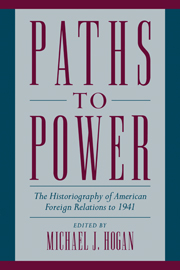Book contents
- Frontmatter
- Dedication
- Contents
- The Authors
- Preface & Acknowledgments
- 1 Introduction
- 2 New Directions in the Study of Early American Foreign Relations
- 3 The Great American Desert Revisited: Recent Literature and Prospects for the Study of American Foreign Relations, 1815-1861
- 4 Coming to Terms with Empire: The Historiography of Late Nineteenth-Century American Foreign Relations
- 5 Symbiosis versus Hegemony: New Directions in the Foreign Relations Historiography of Theodore Roosevelt and William Howard Taft
- 6 The Reclamation of Woodrow Wilson?
- 7 Reaching for the Brass Ring: The Recent Historiography of Interwar American Foreign Relations
- 8 The United States and the European War, 1939-1941: A Historiographical Review
- 9 The Origins of the Second World War in Asia and the Pacific: Synthesis Impossible?
- Index
2 - New Directions in the Study of Early American Foreign Relations
Published online by Cambridge University Press: 12 October 2018
- Frontmatter
- Dedication
- Contents
- The Authors
- Preface & Acknowledgments
- 1 Introduction
- 2 New Directions in the Study of Early American Foreign Relations
- 3 The Great American Desert Revisited: Recent Literature and Prospects for the Study of American Foreign Relations, 1815-1861
- 4 Coming to Terms with Empire: The Historiography of Late Nineteenth-Century American Foreign Relations
- 5 Symbiosis versus Hegemony: New Directions in the Foreign Relations Historiography of Theodore Roosevelt and William Howard Taft
- 6 The Reclamation of Woodrow Wilson?
- 7 Reaching for the Brass Ring: The Recent Historiography of Interwar American Foreign Relations
- 8 The United States and the European War, 1939-1941: A Historiographical Review
- 9 The Origins of the Second World War in Asia and the Pacific: Synthesis Impossible?
- Index
Summary
The study of early American foreign relations has been in the doldrums for a generation. Diplomatie historians have largely overlooked the foreign policy of the early republic while they have debated the major issues of the twentieth Century, especially the Cold War. The preeminence of the United States in this Century, the apocalyptic stakes involved in the Cold War, and the promise of new archival material are some of the factors that have combined to create a sense that the concerns of the twentieth Century are more important than early American foreign relations. Recent historiographers have noted the sparseness of new work in the early period. Jonathan Dull characterizes American foreign relations before the Constitution as “a historiographical wasteland” Kinley Brauer describes the period 1815-61 as “the Great American Desert.” Indeed, if one judges by the amount of work done recently, the field of antebellum American foreign relations is a desert, while Cold War studies are a triple-canopy rain forest.
The apparent end of the Cold War may signal a shift in emphases. The magnitude and speed of the Soviet collapse and the sud den irrelevance of Marxist-Leninist ideology suggest that communism was not as formidable an enemy as was sometimes believed. Moreover, the censorship and destruction of the documentary record of the 1950s has cast doubt on how much historians will be allowed to know about recent events. Blanche Wiesen Cook has gone so far as to ask if “there is a future at all” to the history of recent American foreign relations.
What does seem evident is the extent to which this truly has been the American Century, the Century in which American power and influence has dwarfed that of any other nation. The surrender of the Soviet Union in 1989 spelled victory for the United States in a seventy-five-year war with autocracy, fascism, and communism. The proclamation of a “new world order” represents the culmination of a national mission to transform the world. The roots of this national mission can be traced at least to 1776. American notions of internal political development, international trade, and international law that were visionary in the eighteenth Century have emerged victorious in a form remarkably faithful to their original conception.
- Type
- Chapter
- Information
- Paths to PowerThe Historiography of American Foreign Relations to 1941, pp. 8 - 43Publisher: Cambridge University PressPrint publication year: 2000
- 3
- Cited by



